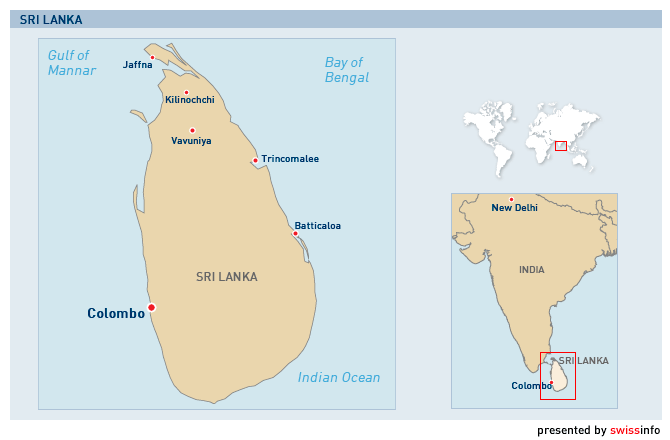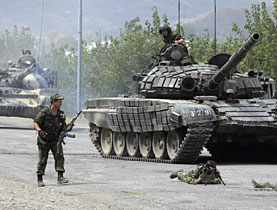Sri Lanka faces “humanitarian catastrophe”

As reports of civilian deaths continue in Sri Lanka, a Swiss aid worker says the lack of independent observers means confusion is the only certainty.
Reinhard Fichtl from Swiss children’s charity Terre des Hommes told swissinfo that the most important thing for aid agencies was to get unlimited access to those in need, but he also stressed the importance of a political, as opposed to military, solution.
Earlier on Tuesday the Sri Lankan military accused the Liberation Tigers of Tamil Eelam (LTTE) of gunning down 19 people fleeing the war zone in the northeast part of the country.
Meanwhile the Swiss-run International Committee of the Red Cross (ICRC) and local fishermen ferried about 240 injured civilians to a specially chartered boat anchored offshore at the village of Putumattalan inside the war zone.
Later on Tuesday the Red Cross said 16 patients had been killed in the shelling of a makeshift hospital. It was unclear who had fired the rounds.
“It’s a very difficult situation. The only agency [in the war zone] is the ICRC – everyone else was kicked out in September 2008,” Fichtl said.
“There are now tens of thousands of people who have a multiple displacement history and have practically nothing. There’s almost no infrastructure, no medical provisions, a very bad supply of food, no shelter. It’s looking like a humanitarian catastrophe.”
The rate of people fleeing fighting between Sri Lanka’s army and the LTTE has picked up sharply in the past week, with the separatist rebels now confined to less than 175 square kilometres.
Nearly 50,000 soldiers are converging on that area in the island’s northeast, aiming to deal a deathblow to a civil war that has flared off and on since 1983 and killed more than 70,000 people.
The 430 Terre des Hommes workers in Sri Lanka make up one of the biggest non-governmental organisations in the region. They look after around 30,000 children, many of whom are malnourished, and around 7,000 children traumatised as a result of war.
Rumours
Fichtl, who is in Batticaloa on the island’s eastern coast, said a major problem was the lack of independent information. “There are no international observers, no journalists and no aid agencies with access to the remaining [175 square kilometres],” he said.
International human rights groups believe more than 200,000 civilians are trapped in the small patch of land still under rebel control. The government says the number is about half that.
The government, rights groups and aid agencies have accused the LTTE of forcing civilians to stay in the war zone to act as a human shield. The rebels deny that.
The LTTE could not be reached for comment because most communication to the war zone has been cut off.
“The problem is that everything is based on rumours,” Fichtl said. “We don’t know whether [the civilians] are there voluntarily or whether the LTTE are keeping them there as hostages as the government claims.”
Priorities
On Tuesday the military said people continued to stream out of the war zone despite a suicide blast on Monday that it blamed on a female LTTE fighter disguised as a civilian, which killed 29 civilians and soldiers and wounded 90 at a refugee registration centre.
Military spokesman Udaya Nanayakkara said those who reached army-held areas had told authorities the LTTE had shot at dozens of fleeing people.
“A total of 1,057 civilians arrived today. The LTTE terrorists had fired on them, killing 19 and injuring 69 others,” Nanayakkara said. He said those fleeing the fighting carried the bodies with them.
That brings the total number of people who have escaped the war zone this year to 28,226, according to the military, nearly all of them in the past week.
Fichtl said aid agency priorities were providing safe drinking water, food and medical supplies and restoring the health service.
“People have been fleeing for months and we fear the health situation is deplorable,” Fichtl said.
Political reforms?
Fichtl said that even if government soldiers managed to take control of the remaining rebel area, it was “doubtful” it would mean the end of the civil war, but at least it would be the end of the military confrontation.
He added: “The LTTE might be defeated, but the Tamil population’s demand for self-determination will continue.”
Fichtl feared that the Sri Lankan government, having just won the war militarily, would be in no rush to start discussing political solutions – “and if there is no political reform, the conflict will certainly continue”.
“The lack of political reforms is ultimately the reason why many people might support the LTTE,” he said. “If political reforms took place, there would be no reason for the LTTE to exist.”
swissinfo, Thomas Stephens
The Tigers started fighting in the 1970s for a separate state for Tamils in Sri Lanka’s north and east. They argued that successive majority Sinhalese governments had discriminated against the Tamils.
The conflict has killed an estimated 70,000 people, displaced thousands more and held back the island’s growth and economic development.
The Tigers pulled out of talks in 2003 and again in 2006, claiming they were being sidelined, and between then and 2008 both sides accused each other of numerous breaches of the ceasefire as the country slid inexorably towards all out war.
Having announced the capture of Mullaitivu, the last of the Tamil Tigers’ northeastern strongholds, the Sri Lankan army says it is very close to defeating the rebels.
With a series of victories in recent months, the Sri Lankan military has boxed the insurgents into a small 300-square-kilometre area in the northeastern part of the island nation. The Red Cross estimates 250,000 civilians are trapped in the shrinking territory still under rebel control.
Both the military and the Tigers have been regularly accused of gross abuses of human rights by organisations such as Amnesty International and Human Rights Watch.
Sri Lankans are one of the biggest migrant groups in Switzerland.
There are 42,000 people of Sri Lankan origin in the country. Between 90 and 95 per cent of them are Tamils.
Since 1973 more than 11,000 Sri Lankans have acquired Swiss citizenship. One third of the Sri Lankans with permanent residence or Swiss citizenship were born in Switzerland.
The Tamils in Switzerland live mainly in the German-speaking areas, in particular cantons Bern, Zurich and Basel.


In compliance with the JTI standards
More: SWI swissinfo.ch certified by the Journalism Trust Initiative












You can find an overview of ongoing debates with our journalists here . Please join us!
If you want to start a conversation about a topic raised in this article or want to report factual errors, email us at english@swissinfo.ch.